Spring Boot Actuator监控详解
Spring Boot Actuator可以帮助你监控和管理Spring Boot应用,比如健康检查、审计、统计和HTTP追踪等。所有这些特性可以通过 JMX或者HTTP endpoint来获得 。
Actuator同时还可以与外部应用监控系统整合,比如 Prometheus , Graphite , DataDog , Influx , Wavefront , New Relic 等。这些系统提供了非常好的仪表盘、图标、分析和告警等功能,使得你可以通过统一的接口轻松的监控和管理你的应用。
Actuator使用 Micrometer 来整合上面提到的外部应用监控系统。这使得只要通过非常小的配置就可以集成任何应用监控系统。
我将把Spring Boot Actuator教程分为两部分:
- 第一部分(本文)教你如何配置Actuator和通过Http endpoints来进入这些特征。
- 第二部分教你如何整合Actuator和外部应用监控系统。
创建一个有Actuator的Spring Boot工程
首先让我们建一个依赖Actuator的简单应用。maven依赖如下:
<dependencies>
<dependency>
<groupId>org.springframework.boot</groupId>
<artifactId>spring-boot-starter-web</artifactId>
</dependency>
<dependency>
<groupId>org.springframework.boot</groupId>
<artifactId>spring-boot-starter-actuator</artifactId>
</dependency>
</dependencies>
复制代码
使用Actuator Endpoints来监控应用
Actuator创建了所谓的 endpoint 来暴露HTTP或者JMX来监控和管理应用。
举个例子
/health /metrics /logger
值得注意的是,每一个actuator endpoint都可以显示的打开或关闭。此外这些endpoint也需要通过HTTP或者JMX暴露出来,使得它们能被远程进入。
让我们运行应用并且尝试进入默认通过HTTP暴露的打开状态的actuator endpoints。之后我们将学习如何打开更多的endpoints并且通过HTTP暴露它们。
创建应用
让我们启动actuator应用,应用默认使用 8080 端口运行。
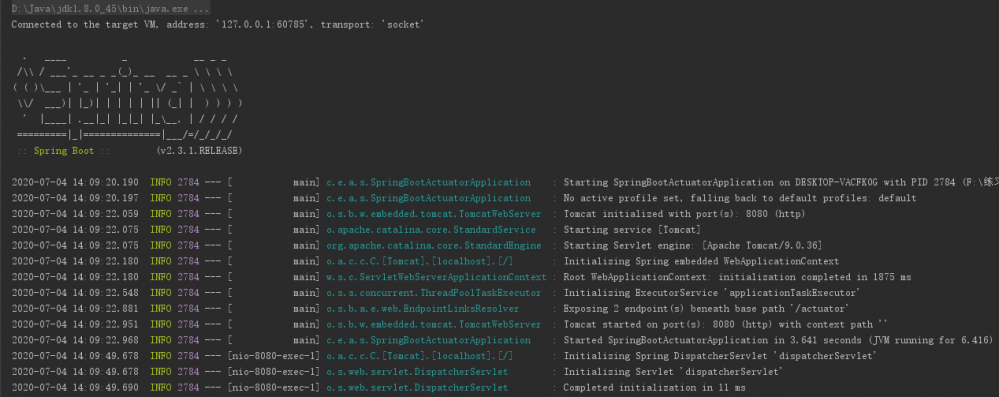
启动成功之后,可以通过 http://localhost:8080/actuator 来展示所有通过HTTP暴露的endpoints。
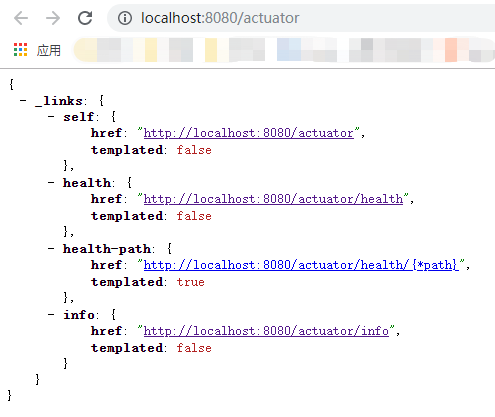
打开 http://localhost:8080/actuator/health ,则会显示如下内容:
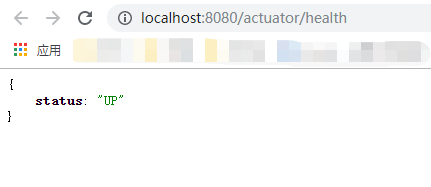
状态将是 UP 只要应用是健康的,如果应用不健康将会显示 DOWN ,比如与仪表盘的连接异常或者缺失磁盘空间等。下一节我们将学习Spring Boot如何决定应用的健康和如何修复这些健康问题。
info endpoint( http://localhost:8080/actuator/info )展示了关于应用的一般信息,这些信息从编译文件,比如 META-INFO/build-info.properties ,或者GIT文件,比如 git.properties 或者任何环境的property中获取。你将在下一节中学习如何改变这个endpoint的输出。
**默认,只有 health 和 info 通过HTTP暴露了出来。**这也是为什么 /actuator 页面只展示了 health 和 info endpoints。我们将学习如何暴露其他endpoint。首先,让我们看看其他的endpoints是什么。
常用actuator endpoints列表
以下是一些非常有用的actuator endpoints列表。你可以在 official documentation 上面看到完整的列表。
| Endpoint ID | Description |
|---|---|
| auditevents | 显示应用暴露的审计事件 (比如认证进入、订单失败) |
| info | 显示应用的基本信息 |
| health | 显示应用的健康状态 |
| metrics | 显示应用多样的度量信息 |
| loggers | 显示和修改配置的loggers |
| logfile | 返回log file中的内容(如果logging.file或者logging.path被设置) |
| httptrace | 显示HTTP足迹,最近100个HTTP request/repsponse |
| env | 显示当前的环境特性 |
| flyway | 显示数据库迁移路径的详细信息 |
| liquidbase | 显示Liquibase 数据库迁移的详细信息 |
| shutdown | 让你逐步关闭应用 |
| mappings | 显示所有的@RequestMapping路径 |
| scheduledtasks | 显示应用中的调度任务 |
| threaddump | 执行一个线程dump |
| heapdump | 返回一个GZip压缩的JVM堆dump |
打开和关闭Actuator Endpoints
默认,上述所有的endpoints都是打开的,除了 shutdown endpoint。
你可以通过设置 management.endpoint..enabled to true or false ( id 是endpoint的id)来决定打开还是关闭一个actuator endpoint。
举个例子,要想打开 shudown endpoint,增加以下内容在你的 application.properties 文件中:
management.endpoint.shutdown.enabled=true 复制代码
暴露Actuator Endpoints
默认,所有的actuator endpoint通过JMX被暴露,而通过HTTP暴露的只有 health 和 info 。
-
通过HTTP暴露actuator endpoints。
# Use "*" to expose all endpoints, or a comma-separated list to expose selected ones management.endpoints.web.exposure.include=health,info management.endpoints.web.exposure.exclude= 复制代码
-
通过JMX暴露actuator endpoints。
# Use "*" to expose all endpoints, or a comma-separated list to expose selected ones management.endpoints.jmx.exposure.include=* management.endpoints.jmx.exposure.exclude= 复制代码
通过设置 management.endpoints.web.exposure.include 为 * ,我们可以在 http://localhost:8080/actuator 页面看到如下内容。
{
"_links":{
"self":{
"href":"http://localhost:8080/actuator",
"templated":false
},
"beans":{
"href":"http://localhost:8080/actuator/beans",
"templated":false
},
"caches-cache":{
"href":"http://localhost:8080/actuator/caches/{cache}",
"templated":true
},
"caches":{
"href":"http://localhost:8080/actuator/caches",
"templated":false
},
"health":{
"href":"http://localhost:8080/actuator/health",
"templated":false
},
"health-path":{
"href":"http://localhost:8080/actuator/health/{*path}",
"templated":true
},
"info":{
"href":"http://localhost:8080/actuator/info",
"templated":false
},
"conditions":{
"href":"http://localhost:8080/actuator/conditions",
"templated":false
},
"shutdown":{
"href":"http://localhost:8080/actuator/shutdown",
"templated":false
},
"configprops":{
"href":"http://localhost:8080/actuator/configprops",
"templated":false
},
"env":{
"href":"http://localhost:8080/actuator/env",
"templated":false
},
"env-toMatch":{
"href":"http://localhost:8080/actuator/env/{toMatch}",
"templated":true
},
"loggers":{
"href":"http://localhost:8080/actuator/loggers",
"templated":false
},
"loggers-name":{
"href":"http://localhost:8080/actuator/loggers/{name}",
"templated":true
},
"heapdump":{
"href":"http://localhost:8080/actuator/heapdump",
"templated":false
},
"threaddump":{
"href":"http://localhost:8080/actuator/threaddump",
"templated":false
},
"metrics-requiredMetricName":{
"href":"http://localhost:8080/actuator/metrics/{requiredMetricName}",
"templated":true
},
"metrics":{
"href":"http://localhost:8080/actuator/metrics",
"templated":false
},
"scheduledtasks":{
"href":"http://localhost:8080/actuator/scheduledtasks",
"templated":false
},
"mappings":{
"href":"http://localhost:8080/actuator/mappings",
"templated":false
}
}
}
复制代码
解析常用的actuator endpoint
/health endpoint
/health endpoint通过合并几个健康指数检查应用的健康情况。
Spring Boot Actuator有几个预定义的健康指标,比如 DataSourceHealthIndicator 、 DiskSpaceHealthIndicator 、 MongoHealthIndicator 、 RedisHealthIndicator 、 CassandraHealthInditor 等。它使用这些健康指标作为健康检查的一部分。
举个例子,如果你的应用使用 Redis , RedisHealthIndicator 将被当作检查的一部分。如果使用 Mongo ,那么 MongoHealthIndicator 将被当作检查的一部分。
你也可以关闭特定的健康检查指标,比如在properties中使用如下命令:
management.health.mongo.enabled=false 复制代码
默认,所有的这些健康指标被当做检查的一部分。
显示详细的健康信息
health endpoint只展示了简单的 UP 和 DOWN 状态。
为了获得健康检查中所有指标的详细信息,你可以通过在 application.properties 中增加如下内容:
management.endpoint.health.show-details=always 复制代码
一旦打开上述开关,你可以在 http://localhost:8080/actuator/health 中看到如下详细内容:
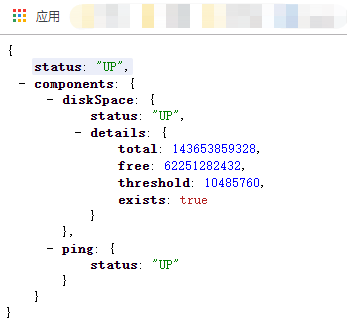
health endpoint现在包含了 DiskSpaceHealthIndicator 。
如果你的应用包含Redis, health endpoints将显示如下内容:
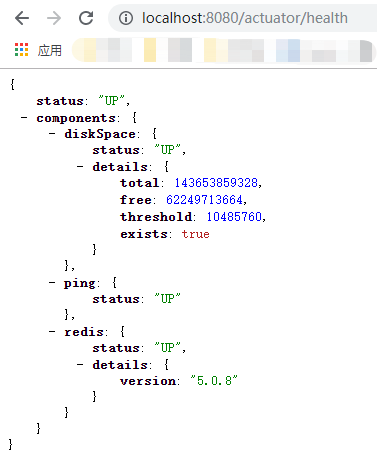
创建一个自定义的健康指标
你可以通过实现 HealthIndicator 接口来定义一个健康指标,或者继承 AbstractHealthIndicatior 类。
package com.example.actuator.springbootactuator;
import org.springframework.boot.actuate.health.AbstractHealthIndicator;
import org.springframework.boot.actuate.health.Health;
import org.springframework.stereotype.Component;
@Component
public class CustomHealthIndicator extends AbstractHealthIndicator {
@Override
protected void doHealthCheck(Health.Builder builder) throws Exception {
// Use the builder to build the health status details that should be reported.
// If you throw an exception, the status will be DOWN with the exception message.
builder.up()
.withDetail("app", "Alive and Kicking")
.withDetail("error", "Nothing! I'm good.");
}
}
复制代码
一旦你增加上面的健康指标到你的应用中去, health endpoints将展示如下细节:
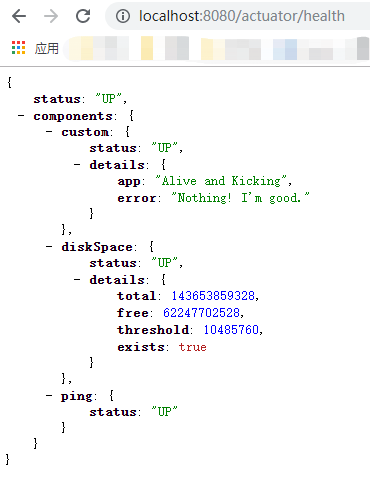
/metrics endpoint
metrics endpoint展示了你可以追踪的所有度量。
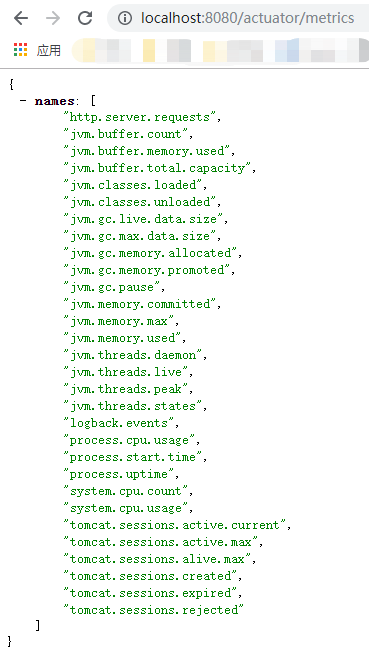
想获得每个度量的详细信息,你需要传递度量的名称到URL中,像 http://localhost:8080/actuator/metrics/{MetricName}
举个例子,获得 system.cpu.usage 的详细信息,使用URL http://localhost:8080/actuator/metrics/system.cpu.usage 。
它将显示如下内容:
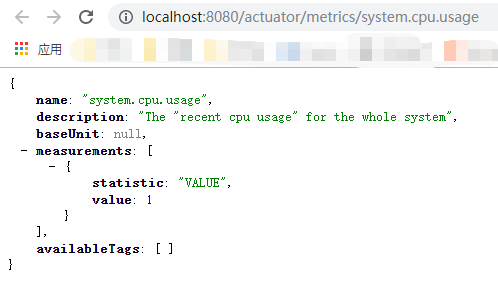
/loggers endpoint
loggers endpoint,可以通过访问 http://localhost:8080/actuator/loggers 来进入。他展示了应用中可配置的loggers的列表和相关日志等级。
你同样能够使用 http://localhost:8080/actuator/loggers/{name} 来展示特定logger的细节。
举个例子,为了获得 root logger的细节,你可以使用 http://localhost:8080/actuator/loggers/ROOT :
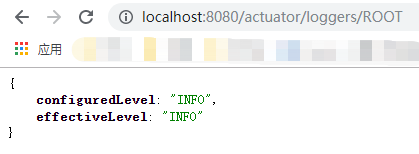
在运行时改变日志等级
loggers endpoint也允许你在运行时改变应用的日志等级。
举个例子,为了改变 root logger的等级为 DEBUG ,发送一个 POST 请求到 http://localhost:8080/actuator/loggers/ROOT ,加入如下参数
{
"configuredLevel": "DEBUG"
}
复制代码
这个功能对于线上问题的排查非常有用。
同时,你可以通过传递 null 值给 configuredLevel 来重置日志等级。
/info endpoint
/info endpoint展示了应用的基本信息。它通过 META-INF/build-info.properties 来获得编译信息,通过 git.properties 来获得git信息。它同时可以展示任何其他信息,只要这个环境property中含有 info key。
你可以增加properties到 application.properties 中,比如:
# INFO ENDPOINT CONFIGURATION info.app.name=@project.name@ info.app.description=@project.description@ info.app.version=@project.version@ info.app.encoding=@project.build.sourceEncoding@ info.app.java.version=@java.version@ 复制代码
注意,我使用了Spring Boot的 Automatic property expansion 特征来扩展来自maven工程的properties。
一旦你增加上面的properties, info endpoint将展示如下信息:
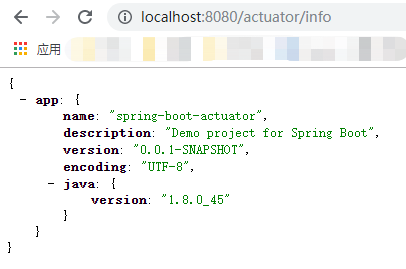
注解方式自定义Endpoint
编写自定义endpoint
@Endpoint(id = "my-endpoint")
public class MyEndpoint {
@ReadOperation
public Map<String, Object> endpoint() {
Map<String, Object> map = new HashMap<>(16);
map.put("当前时间:", new Date().toString());
map.put("message", "this is my endpoint");
return map;
}
}
复制代码
编写配置类
@Configuration
public class EndpointConfiguration {
@Bean
public MyEndpoint endpoint() {
return new MyEndpoint();
}
}
复制代码
结果
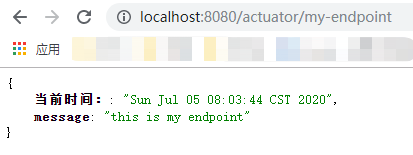
注意
-
@EndPoint中的id不能使用驼峰法,需要以-分割 - Spring Boot会去扫描
@EndPoint注解下的@ReadOperation,@WriteOperation,@DeleteOperation注解,分别对应生成Get/Post/Delete的Mapping。注解中有个produces参数,可以指定media type, 如:application/json等。
使用Spring Security来保证Actuator Endpoints安全
Actuator endpoints是敏感的,必须保障进入是被授权的。如果Spring Security是包含在你的应用中,那么endpoint是通过HTTP认证被保护起来的。
如果没有,你可以增加以下依赖到你的应用中去:
<dependency> <groupId>org.springframework.boot</groupId> <artifactId>spring-boot-starter-security</artifactId> </dependency> 复制代码
接下来让我们看一下如何覆写spring security配置,并且定义你自己的进入规则。
下面的例子展示了一个简单的spring security配置。它使用叫做 EndPointRequest 的 RequestMatcher 工厂模式来配置Actuator endpoints进入规则。
package com.example.actuator.springbootactuator;
import org.springframework.boot.actuate.autoconfigure.security.servlet.EndpointRequest;
import org.springframework.boot.actuate.context.ShutdownEndpoint;
import org.springframework.boot.autoconfigure.security.servlet.PathRequest;
import org.springframework.context.annotation.Configuration;
import org.springframework.security.config.annotation.web.builders.HttpSecurity;
import org.springframework.security.config.annotation.web.configuration.WebSecurityConfigurerAdapter;
@Configuration
public class ActuatorSecurityConfig extends WebSecurityConfigurerAdapter {
@Override
protected void configure(HttpSecurity http) throws Exception {
http
.authorizeRequests()
.requestMatchers(EndpointRequest.to(ShutdownEndpoint.class))
.hasRole("ACTUATOR_ADMIN")
.requestMatchers(EndpointRequest.toAnyEndpoint())
.permitAll()
.requestMatchers(PathRequest.toStaticResources().atCommonLocations())
.permitAll()
.antMatchers("/")
.permitAll()
.antMatchers("/**")
.authenticated()
.and().httpBasic();
}
}
复制代码
为了能够测试以上的配置,你可以在 application.propert 中增加spring security用户。
# Spring Security Default user name and password spring.security.user.name=actuator spring.security.user.password=actuator spring.security.user.roles=ACTUATOR_ADMIN 复制代码
下一部分: Spring Boot Metrics监控之Prometheus&Grafana
- 本文标签: description 数据 Cassandra dependencies Word IO HashMap root maven tar UI App 参数 http cache mongo web db js 配置 空间 list ask bean bug zip 端口 https map 时间 key 统计 Property springboot java tab git 安全 代码 json src Security Spring Security spring authenticate ip cat 管理 Select build message Spring Boot rmi 认证 线程 IDE Document example Logging id 测试 servlet 数据库 redis 解析 dataSource ACE MQ JVM 编译
- 版权声明: 本文为互联网转载文章,出处已在文章中说明(部分除外)。如果侵权,请联系本站长删除,谢谢。
- 本文海报: 生成海报一 生成海报二











![[HBLOG]公众号](https://www.liuhaihua.cn/img/qrcode_gzh.jpg)

